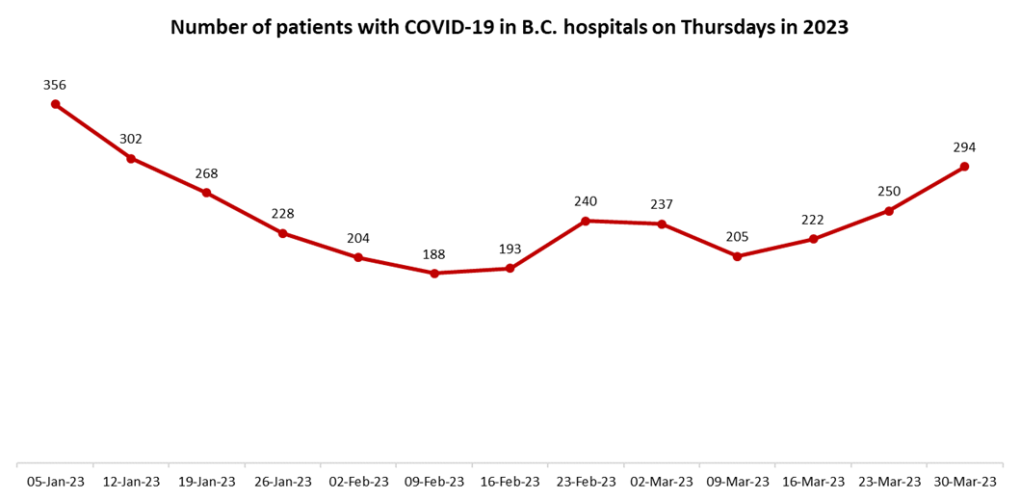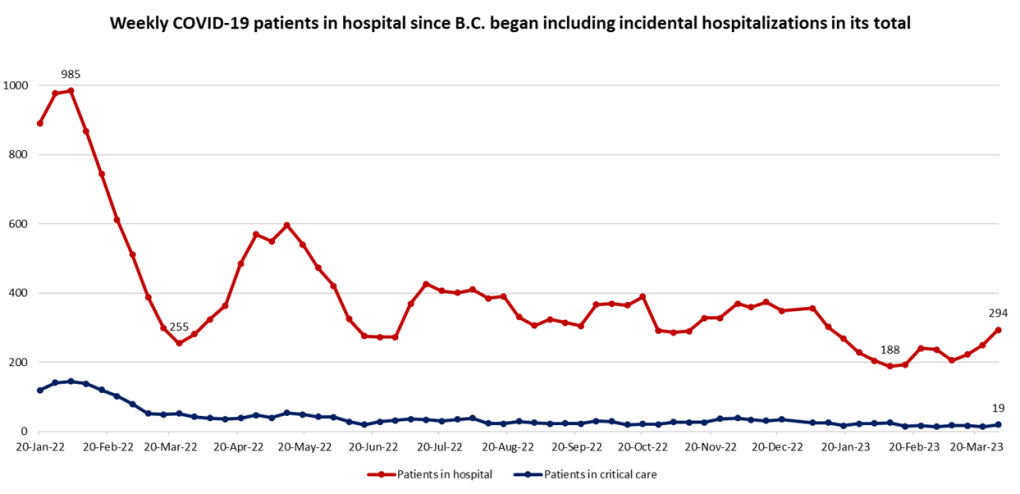B.C. COVID-19 data suggests increasing transmission

Indicators of the spread of COVID-19 in B.C. continued their upward trend this week, with the number of people hospitalized with the disease hitting its highest level since Jan. 12.
There were 294 people in hospital with the coronavirus in B.C. as of Thursday, up from 250 last week, an increase of nearly 18 per cent.
 The number of people in B.C. hospitals with COVID-19 in 2023 is shown. (CTV)
The number of people in B.C. hospitals with COVID-19 in 2023 is shown. (CTV)
The growth in the hospital population matches recent trends in other indicators, including the official case count and wastewater surveillance data.
The number of people currently in hospital with COVID-19 – sometimes called the hospital census – includes both those with serious cases of the disease requiring medical care and those who are hospitalized for other reasons and test positive incidentally.
Health officials have said between 40 and 50 per cent of those in hospital at any given time are there because of COVID-19, rather than for some other reason, meaning the majority of hospitalizations are incidental.
The 294 people in B.C. hospitals this week represent the third-highest total the province has seen on a Thursday so far this year.
Relative to 2022, however, when the hospital census rose as high as 985 and rarely dropped below 300, hospitalizations are still fairly low in B.C.
 The number of people in B.C. hospitals with COVID-19 on Thursdays since the province switched to a "hospital census" model in January 2022 is shown. (CTV)
The number of people in B.C. hospitals with COVID-19 on Thursdays since the province switched to a "hospital census" model in January 2022 is shown. (CTV)
OTHER DATA
Just how high the current wave of infections will rise is difficult to predict, but the available indicators do not yet show any signs of slowing down.
The B.C. Centre for Disease Control reported Thursday that 456 new, lab-confirmed cases of COVID-19 had been detected during the epidemiological week of March 19 to 25.
That's an increase from the 405 new cases reported last week for the period of March 11 to 18.
Similarly, the BCCDC reported 135 new hospital admissions during the week of March 19 to 25, up from 105 initially reported for the week before.
Both of these metrics – the official case count and new hospitalizations – come with notable caveats, but each one continues to move in a direction that suggests rising transmission of COVID-19.
The official case count is limited because it only includes infections confirmed through lab-based testing, which is not available to the vast majority of B.C. residents. The official count also excludes reinfections.
New hospital admission figures are limited because they are incomplete when the BCCDC first reports them. Last week's total of 105 new hospitalizations for the period of March 11 to 18 has but updated in this week's report to 143. This week's total of 135 for the period of March 19 to 25 will similarly see an increase when next week's data is released.
WASTEWATER
To supplement its other data, the BCCDC also monitors concentrations of the coronavirus in wastewater across the Lower Mainland and in several communities in the Interior and on Vancouver Island.
Throughout March, wastewater surveillance has shown rising levels of SARS-CoV-2 at every monitored treatment plant.
Last week, the BCCDC announced for the first time that it had begun using a more sensitive test on Feb. 28.
This week, the agency updated its wastewater surveillance data to remove trendlines, citing uncertainty caused by the change in testing methods as the reason. It says the removal of trendlines is temporary.
"(The new test) is more efficient and more sensitive, meaning it can yield a higher test result even if viral levels have not changed," a statement on the BCCDC wastewater surveillance page reads.
"Therefore, observed increases in viral concentrations in wastewater since the beginning of March are likely due, at least in part, to this new test. Trend analysis and interpretation are influenced as a result."
The agency says it is "retesting archived samples" to evaluate the impact the change in testing method has had on the data.
"BCCDC acknowledges that the public and health-care partners use wastewater data to understand how SARS-CoV-2 is spreading in B.C. and to assess their risk of infection," the statement continues. "We anticipate next week’s wastewater update will describe how the change in test affected trends and recent results."
CTVNews.ca Top Stories

Biden pardons his son Hunter despite previous pledges not to
U.S. President Joe Biden pardoned his son, Hunter, on Sunday night, sparing the younger Biden a possible prison sentence for federal felony gun and tax convictions and reversing his past promises not to use the extraordinary powers of the presidency for the benefit of his family.
Canada Post presents union with 'framework' to reach deal as strike continues
Canada Post has presented the union representing some 55,000 striking postal workers with a framework to reach negotiated agreements, the corporation said.
'Devastating': Missing Surrey, B.C. teen found dead, family says
The family of a missing 18-year-old, who was last seen in Surrey over a month ago, says there has been a tragic end to the search.
opinion Are you overpaying for subscriptions? It's time for an audit
From streaming platforms and apps to gym memberships and meal kits, subscriptions are convenient, but it's easy to overlook how much you're spending. Personal finance contributor Christopher Liew offers tips on how to audit your subscriptions to save money.
Elton John says he has lost his eyesight and struggles to see his new stage musical
Elton John says he struggled to watch his new musical because he has lost his eyesight after contracting an infection.
PM Trudeau 'surprised' provinces unanimous on accelerated defence spending: Ford
Ontario Premier Doug Ford says his fellow provincial leaders are united in pushing for Canada to meet its NATO defence spending targets ahead of schedule, and that Prime Minister Justin Trudeau was 'surprised' to hear it.
Muskoka reacts to major snowfall, Highway 11 still closed
From road closures, power outages, weather declarations and nonstop shoveling, Muskoka residents were faced with nearly a metre of persistent snowfall this weekend.
Stellantis CEO resigns as carmaker sales continue to slump
Stellantis CEO Carlos Tavares is stepping down after nearly four years in the top spot of the automaker, which owns car brands like Jeep, Citroën and Ram, amid an ongoing struggle with slumping sales.
56 people killed in stampede following clashes at a Guinea soccer match, authorities say
Fifty-six people were killed and several injured in a stampede at a soccer stadium in southern Guinea, following clashes between fans, Guinea's government said Monday.

































